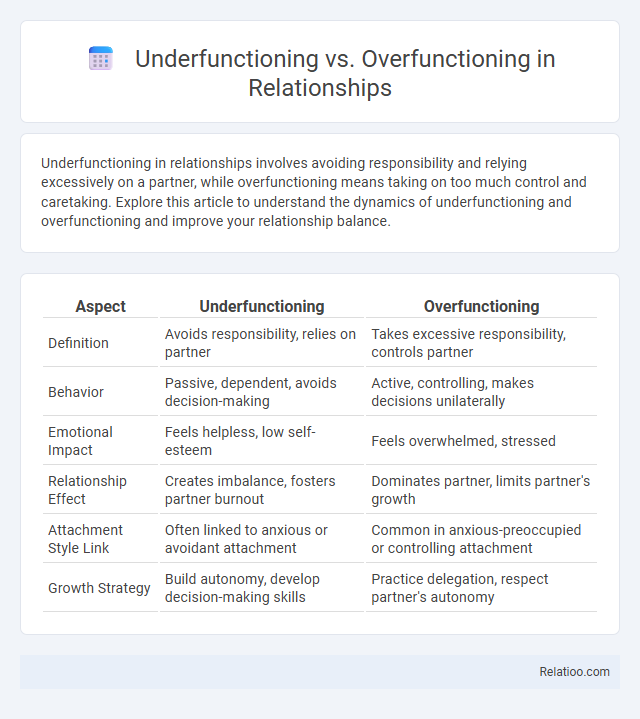Underfunctioning in relationships involves avoiding responsibility and relying excessively on a partner, while overfunctioning means taking on too much control and caretaking. Explore this article to understand the dynamics of underfunctioning and overfunctioning and improve your relationship balance.
Table of Comparison
| Aspect | Underfunctioning | Overfunctioning |
|---|---|---|
| Definition | Avoids responsibility, relies on partner | Takes excessive responsibility, controls partner |
| Behavior | Passive, dependent, avoids decision-making | Active, controlling, makes decisions unilaterally |
| Emotional Impact | Feels helpless, low self-esteem | Feels overwhelmed, stressed |
| Relationship Effect | Creates imbalance, fosters partner burnout | Dominates partner, limits partner's growth |
| Attachment Style Link | Often linked to anxious or avoidant attachment | Common in anxious-preoccupied or controlling attachment |
| Growth Strategy | Build autonomy, develop decision-making skills | Practice delegation, respect partner's autonomy |
Understanding Underfunctioning and Overfunctioning
Understanding underfunctioning and overfunctioning in relationships involves recognizing how imbalances in responsibility and effort affect emotional dynamics and communication patterns. Underfunctioning occurs when one partner consistently avoids taking initiative or addressing issues, leading to frustration and resentment, while overfunctioning happens when the other partner takes on excessive roles to compensate, causing burnout and dependency. Your ability to identify these behaviors helps create healthier boundaries and promotes balanced partnership growth.
Key Differences Between Underfunctioning and Overfunctioning
Underfunctioning in relationships involves consistently failing to meet responsibilities or contribute effectively, often leading to imbalance and frustration. Overfunctioning occurs when one partner takes on excessive roles and control, compensating for the other's underperformance and risking burnout. Key differences include the allocation of emotional labor, with underfunctioners withdrawing or avoiding tasks while overfunctioners assume disproportionate responsibility to maintain relationship stability.
Signs of Underfunctioning in Relationships
Signs of underfunctioning in relationships include consistently avoiding responsibilities, frequent reliance on the partner to manage daily tasks, and a lack of initiative in problem-solving or emotional support. Underfunctioners often exhibit low self-esteem and may withdraw during conflicts, leading to imbalance and increased stress for their partners. Recognizing these behaviors is crucial to fostering healthier communication and shared responsibility within the relationship.
Recognizing Overfunctioning Behaviors
Overfunctioning behaviors in relationships manifest as taking excessive responsibility for others' emotions and tasks, often leading to control issues and burnout. You may notice patterns such as overplanning, rescuing partners from consequences, or suppressing your own needs to maintain harmony. Recognizing these signs is essential to creating balance and fostering healthier, more interdependent connections.
Common Causes of Underfunctioning
Common causes of underfunctioning in relationships include low self-esteem, fear of failure, and lack of motivation. You may struggle to meet expectations due to stress, mental health issues, or unclear role definitions within the partnership. Recognizing these underlying factors can help address imbalance and improve relationship dynamics.
Root Causes of Overfunctioning in Partners
Overfunctioning in relationships often stems from deep-rooted issues such as insecurity, fear of abandonment, or a need for control, leading one partner to take on excessive responsibilities to compensate for perceived shortcomings. This behavior can mask underlying emotional struggles and a lack of trust in the partner's capabilities, creating an imbalance that strains the relationship. Understanding these root causes helps address the dynamics of overfunctioning, promoting healthier communication and shared accountability between partners.
Impact on Relationship Dynamics
Underfunctioning in relationships often leads to imbalance, causing partners to feel burdened by disproportionate responsibility and resulting in frustration or resentment. Overfunctioning can create dependency and hinder personal growth, as one partner consistently takes control to compensate for the other's lack of initiative. These dynamics disrupt healthy communication, reduce mutual accountability, and ultimately impair emotional connection within the partnership.
Breaking the Underfunctioning-Overfunctioning Cycle
Breaking the underfunctioning-overfunctioning cycle in relationships requires recognizing and addressing imbalanced roles where one partner consistently overextends while the other withdraws or relies excessively. Effective strategies include establishing clear boundaries, encouraging open communication about needs and expectations, and fostering mutual responsibility to promote healthier interdependence. Understanding attachment styles and seeking professional therapy can also facilitate breaking repetitive patterns and creating more balanced, supportive partnerships.
Strategies for Achieving Balance in Relationships
Balancing underfunctioning and overfunctioning in relationships requires clear communication and setting healthy boundaries to ensure mutual responsibility and respect. Couples should establish shared goals and regularly assess their roles to prevent burnout or neglect, promoting emotional equality. Implementing consistent feedback loops and seeking professional guidance can enhance understanding and foster a balanced dynamic that supports both partners' well-being.
Seeking Help: When Professional Support is Needed
Recognizing when your relationship struggles stem from underfunctioning or overfunctioning patterns is crucial for seeking professional support. Underfunctioning often involves withdrawal and avoidance of responsibilities, while overfunctioning leads to controlling behaviors and excessive caretaking, both impacting communication and emotional balance. You benefit greatly from therapy or counseling when these patterns create persistent conflict, emotional disconnection, or imbalance that you cannot resolve on your own.

Infographic: Underfunctioning vs Overfunctioning in Relationships
 relatioo.com
relatioo.com